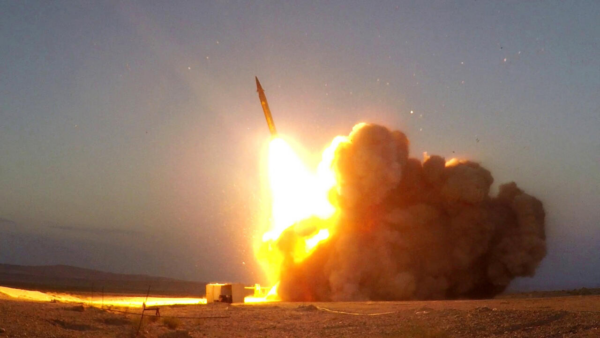(IRGC) claimed responsibility for strikes that killed prominent Kurdish businessman Peshraw Dizayee in Iraqi Kurdistan and his family.
By: Paul Iddon
Iran’s Islamic Revolutionary Guard Corps (IRGC) paramilitary directly attacked Iraqi Kurdistan’s capital city, Erbil, again with ballistic missiles just before midnight Monday local time.
The target was not, as initially speculated, the large new U.S. consulate or the American troop base in Erbil International Airport. IRGC missiles descended on the house of a well-known local businessman, killing him and members of his family. Explosions were heard throughout the city, alarming many residents.
The IRGC promptly claimed responsibility for the attack and a simultaneous strike on Syria. In Erbil, the powerful paramilitary claimed its missiles targeted a “Mossad headquarters” in retaliation for Israel’s prior assassination of IRGC members, claiming the target “was responsible for planning and running espionage operations and terrorist activities in the region.”
The Syria attack purportedly targeted the Islamic State, whose Afghan faction claimed responsibility for the deadly Jan. 3 terrorist attack on Iran’s southeastern Kerman province, which killed over 90 people.
In reality, the Erbil attack struck the house of Kurdish businessman Peshraw Dizayee, owner of the autonomous region’s Falcon Group, responsible for major projects such as the Empire World, essentially Erbil’s central business district known for its ubiquitous high-rise apartment complexes.

(IRGC) claimed responsibility for strikes that killed prominent Kurdish businessman Peshraw Dizayee ( pictured) in Iraqi Kurdistan and his family.
The attack killed Dizayee and four of his family members, according to both sources cited by local Kurdish media outlet Rudaw and a post on X by the former deputy speaker of Iraqi Kurdistan’s parliament, Hemin Hawrami.
In an official statement a few hours after the attack, the Kurdistan Region Security Council confirmed the deaths of four civilians while at least six others sustained injuries, some severe. It also condemned the IRGC’s justification for the attack, saying the paramilitary has always used unfounded justifications to attack Erbil even though neither Iraqi Kurdistan nor its leadership has ever threatened Iran.
Erbil had come under a spate of drone attacks in recent weeks, most of them carried out by Iran’s local proxies and targeting the American base on the airport grounds. One of those attacks injured three U.S. troops, one critically, on Dec. 25. The U.S. then assassinated militia leader Mushtaq Jawad Kazim al-Jawari in Baghdad on Jan. 4, in what the Defense Department described as a “self-defense strike.”
But Monday night’s attack was markedly different than these tit-for-tat strikes. The White House confirmed shortly after the attack that “no U.S. personnel or facilities” had been targeted in either Erbil or Syria. It also called the IRGC strikes “reckless and imprecise.”
The attack was undoubtedly “reckless,” but it wasn’t necessarily imprecise. Iran has proven time and again over the years the accuracy of its ballistic missiles, beginning with its September 2018 pinpoint strike against the headquarters of an Iranian Kurdish opposition group based in Iraqi Kurdistan.

(IRGC) claimed responsibility for strikes that killed prominent Kurdish businessman Peshraw Dizayee in Iraqi Kurdistan and his family in his mansion ( shown) in Irbil .
It’s not even the first time Iran has targeted the villa of a Kurdish businessman in Erbil.
On Mar. 13, 2022, the IRGC fired 12 Fateh-110 ballistic missiles at the villa of Baz Karim Barzanji. At that time, the paramilitary also claimed to have targeted “strategic centers” belonging to Israel in the Kurdish capital. In reality, they targeted Barzanji’s villa because they opposed a plan involving Barzanji’s KAR Group company to supply Turkey and Europe with gas, according to a Reuters exclusive.
Unlike the case with Dizayee and his family members, Barzanji and his family were not home during the attack. Their villa was heaviy damaged in the attack and the headquarters of the nearby regional Kurdistan 24 news agency also endured relatively minor damage from the impact.
The Iraqi government and the autonomous Kurdistan Regional Government scrambled to disprove Iranian claims the missiles had destroyed a Mossad headquarters by dispatching a fact-finding team to the scene of the attack to demonstrate there was no threat to Iran emanating from there. Unsurprisingly, it did not undercover anything. Politicians and journalists milled around the scene of senseless destruction in the days after the attack, posed for photos, and left.
The Pirmam area is home to the headquarters of Iraqi Kurdistan’s most prominent political party, the Kurdistan Democratic Party. It’s worth noting that Pirmam endured another unprecedented attack on Dec. 30, when two militia drones targeted a base belonging to the Kurdish Peshmerga security forces there but did not cause any casualties. Still, these militias had never directly targeted the Peshmerga inside Iraqi Kurdistan before.
In retrospect, that attack and Monday night’s unprecedented strike were seemingly warnings against the KDP and the broader regional autonomous government. Why exactly Dizayee and his family, in particular, were chosen for this heinous attack remains unclear, although it seems intended to terrorize the autonomous region and threaten its leadership.
What is clear is that Iraqi Kurdistan faces unprecedented threats from its neighbor and requires air defenses to defend itself against such flagrant acts of aggression and the targeting of its civilians.
Forbes


Leave a Reply
You must be logged in to post a comment.